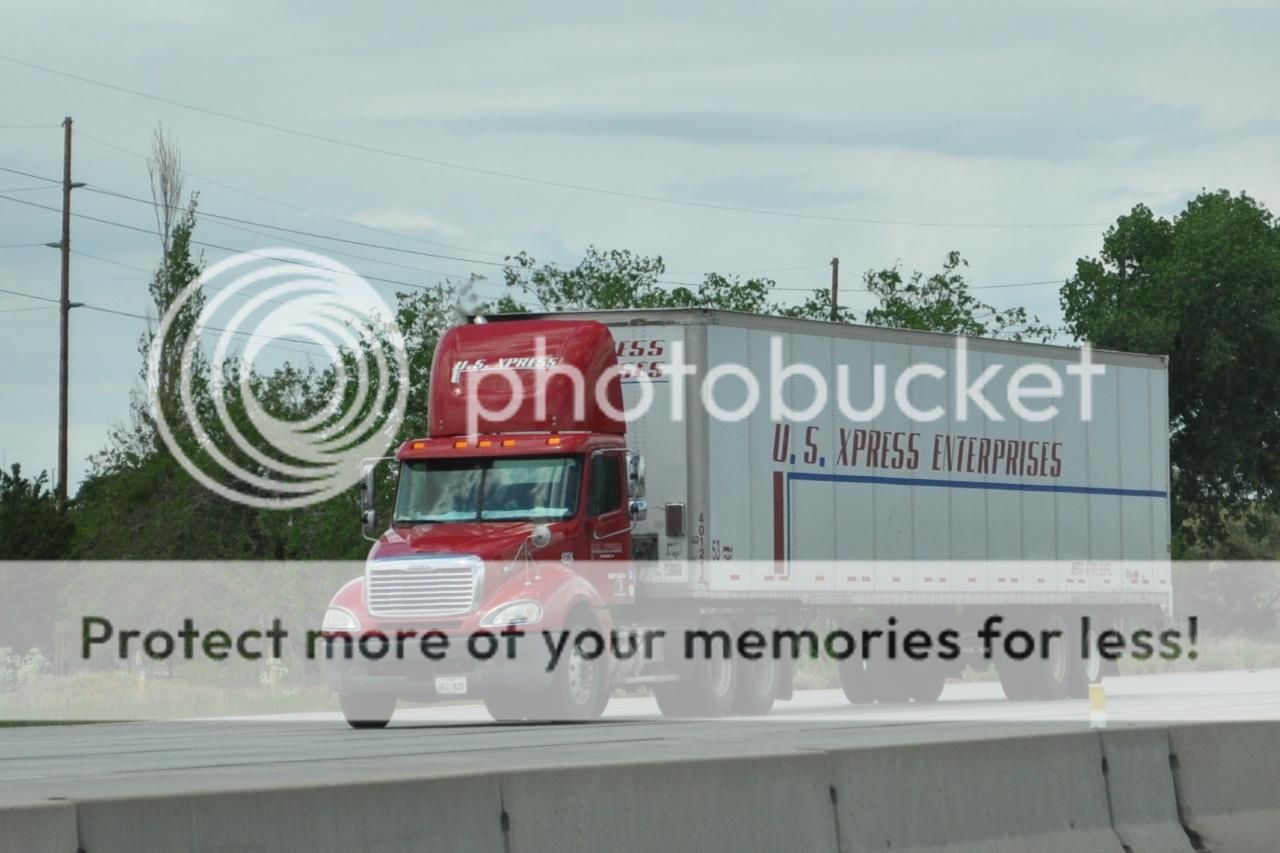Why Prefer Reefer?
Topic 3123 | Page 1

I've never pulled reefer but maybe in the summer time you get to go inside to clean it out and it's nice and cool in there, so that's a benefit. Also with the loading/unloading wait times maybe some people see that as a benefit. They can take naps, do some movie watching, or whatever, more often than with drop/hook dry van loads. Also in reefer the miles are more consistent and there's not much of a drop in the winter as with other types of freight.
Dry Van:
A trailer or truck that that requires no special attention, such as refrigeration, that hauls regular palletted, boxed, or floor-loaded freight. The most common type of trailer in trucking.Reefer:
A refrigerated trailer.

I've never pulled reefer but maybe in the summer time you get to go inside to clean it out and it's nice and cool in there, so that's a benefit. Also with the loading/unloading wait times maybe some people see that as a benefit. They can take naps, do some movie watching, or whatever, more often than with drop/hook dry van loads. Also in reefer the miles are more consistent and there's not much of a drop in the winter as with other types of freight.
The consistent freight in winter is a big plus.
Dave
Dry Van:
A trailer or truck that that requires no special attention, such as refrigeration, that hauls regular palletted, boxed, or floor-loaded freight. The most common type of trailer in trucking.Reefer:
A refrigerated trailer.

I appreciate your responses. Downtime could actually be a plus, depending on your taste. Consistent freight is a biggee...although I believe the company I'm interested in (Shaffer) has dedicated accounts.

I did refer for 15 years and loved it. Sure there are longer wait times at shipper and receivers if you don't have a drop and hook account. Best thing I liked about it was when refer freight slowed down I could always haul dry freight. Which we did alot of. Lots of options that you don't have with dry vans.
Shipper:
The customer who is shipping the freight. This is where the driver will pick up a load and then deliver it to the receiver or consignee.
Dry Van:
A trailer or truck that that requires no special attention, such as refrigeration, that hauls regular palletted, boxed, or floor-loaded freight. The most common type of trailer in trucking.Drop And Hook:
Drop and hook means the driver will drop one trailer and hook to another one.
In order to speed up the pickup and delivery process a driver may be instructed to drop their empty trailer and hook to one that is already loaded, or drop their loaded trailer and hook to one that is already empty. That way the driver will not have to wait for a trailer to be loaded or unloaded.

Would you guys say that if I started as a rookie, pulling reefer , that I'd have more job openings should I choose to leave my first company? My thought process is - learn to pull a reefer, you can pull a dry van. Some companies might prefer reefer specific experience - I've already ran across one.
Dry Van:
A trailer or truck that that requires no special attention, such as refrigeration, that hauls regular palletted, boxed, or floor-loaded freight. The most common type of trailer in trucking.Reefer:
A refrigerated trailer.
OOS:
When a violation by either a driver or company is confirmed, an out-of-service order removes either the driver or the vehicle from the roadway until the violation is corrected.
Would you guys say that if I started as a rookie, pulling reefer , that I'd have more job openings should I choose to leave my first company? My thought process is - learn to pull a reefer, you can pull a dry van. Some companies might prefer reefer specific experience - I've already ran across one.
I would say no. Nobody ever really requires reefer experience because the unit runs itself. It's no more difficult than running the thermostat in your house. You set the temperature and watch to make sure the light stays green, signifying that everything is running properly. If the light turns red and you know you're not out of fuel for the reefer then you take it to a repair shop.
There's really nothing about pulling a reefer versus a dry van that can't be taught to anyone in an hour. Tanker and flatbed experience might open up more job opportunities in those areas because there's a lot more to know and not every company is setup to train people. They'd rather bring in people that already know the job. But reefer and dry van drivers are pretty much interchangeable. In fact I drove for TRL for a year one time and they had both. We never knew what type of freight we'd be hauling from one load to the next.
I think the biggest perks for pulling refrigerated are the opportunity to do coast to coast runs as a solo driver (depending on the company you're with) and the freight staying more steady during the slow times.
Dry Van:
A trailer or truck that that requires no special attention, such as refrigeration, that hauls regular palletted, boxed, or floor-loaded freight. The most common type of trailer in trucking.Reefer:
A refrigerated trailer.
HOS:
Hours Of Service
HOS refers to the logbook hours of service regulations.OOS:
When a violation by either a driver or company is confirmed, an out-of-service order removes either the driver or the vehicle from the roadway until the violation is corrected.

Brett - Those were my sentiments as well, but a company like Arctic Express has reefer experience as a 'plus.' Guess that might be able to be interpreted as having an advantage if you had prior reefer experience, doesn't mean they wouldn't hire you if you only had dry van experience. I don't plan on applying to Arctic Express, it was just one example of a few companies I ran across that had reefer experience as desirable.
At the end of the day, I'll roll w/ whatever company can get me home more frequently, or have more opportunities for a dedicated account - which I'd really love to have! I just figured that going w/ Shaffer would give me something I could mark as experience that Crete might not, i.e. pulling a reefer.
That Harley-Davidson dedicated account out of York, PA with Schneider keeps calling me (as does the opportunity to drive a tanker), but I like Crete / Shaffer overall just a bit better. Plus, by the time I get my CDL , that Harley-Davidson gig might not even be available anymore. Although, they've had that job posted on their website since the Holidays.
The fact that Crete / Shaffer has you in training for 8 weeks is a very attractive quality to me. I know Schneider is renowned for their training, but the more time I can have with a trainer, the more I think I'd feel comfortable. And it might sound silly, but hauling food and items most people HAVE to have, might give me more of a sense of satisfaction. Then again, Shaffer hauls a lot of sweets, and I'd hate to feel like I was contributing to the American diabetic epidemic ;)
CDL:
Commercial Driver's License (CDL)
A CDL is required to drive any of the following vehicles:
- Any combination of vehicles with a gross combined weight rating (GCWR) of 26,001 or more pounds, providing the gross vehicle weight rating (GVWR) of the vehicle being towed is in excess of 10,000 pounds.
- Any single vehicle with a GVWR of 26,001 or more pounds, or any such vehicle towing another not in excess of 10,000 pounds.
- Any vehicle, regardless of size, designed to transport 16 or more persons, including the driver.
- Any vehicle required by federal regulations to be placarded while transporting hazardous materials.
Dry Van:
A trailer or truck that that requires no special attention, such as refrigeration, that hauls regular palletted, boxed, or floor-loaded freight. The most common type of trailer in trucking.Reefer:
A refrigerated trailer.
HOS:
Hours Of Service
HOS refers to the logbook hours of service regulations.New Reply:
New! Check out our help videos for a better understanding of our forum features

















Preview:








 TT On Facebook
TT On Facebook
OK, simple question for all you reefer drivers. This isn't necessarily yet another comparison of "reefer vs ____." I really wanna know if some of you drivers like to pull a reefer for other reasons. The obvious reasons why most drivers pull a reefer are:
1. higher cpm 2. (related to #1) more miles, since a lot of cross country runs due to produce etc... 3. ability to take loads that might also go in a dry van - i.e., versatility
So, any other reason on why you would actually want to pull a reefer?
Dry Van:
A trailer or truck that that requires no special attention, such as refrigeration, that hauls regular palletted, boxed, or floor-loaded freight. The most common type of trailer in trucking.CPM:
Cents Per Mile
Drivers are often paid by the mile and it's given in cents per mile, or cpm.
Reefer:
A refrigerated trailer.